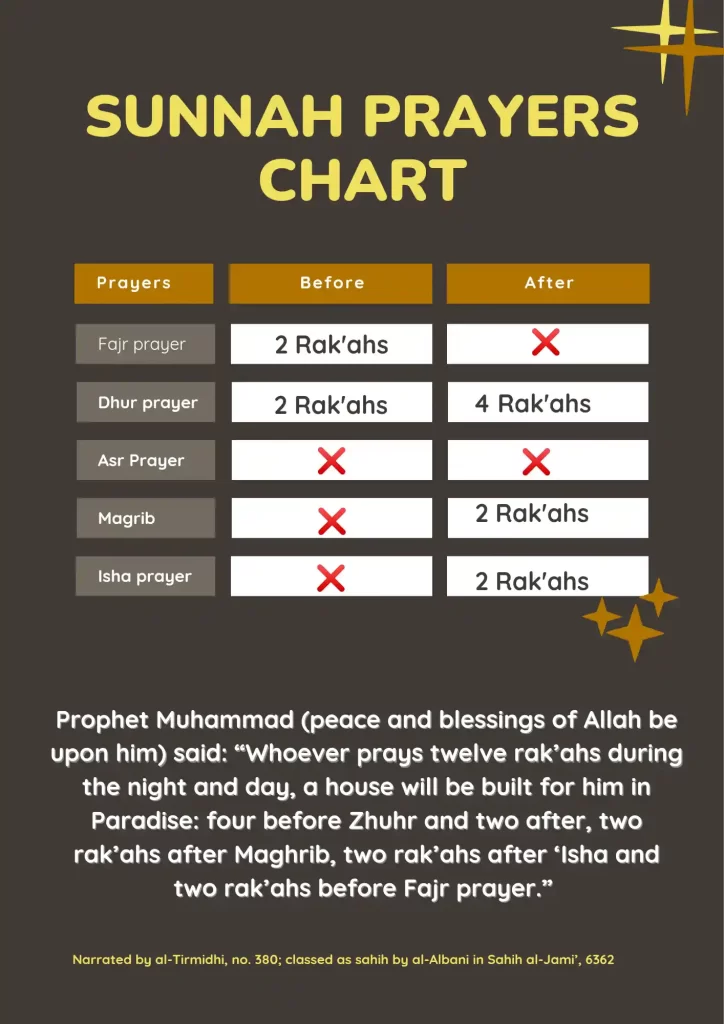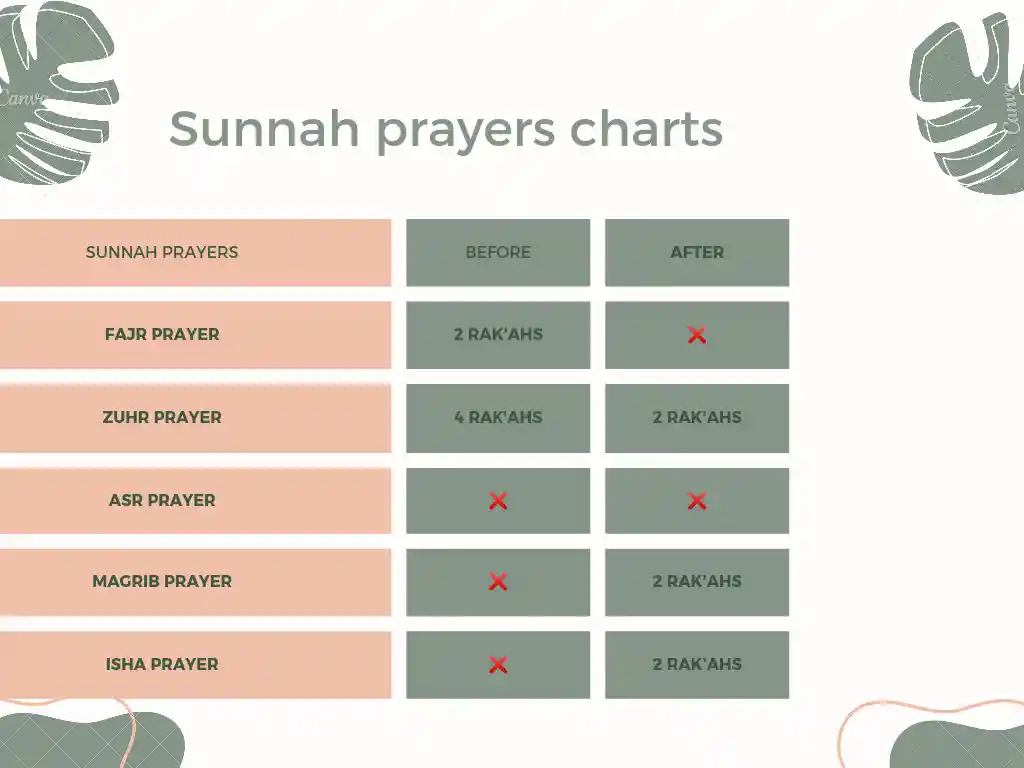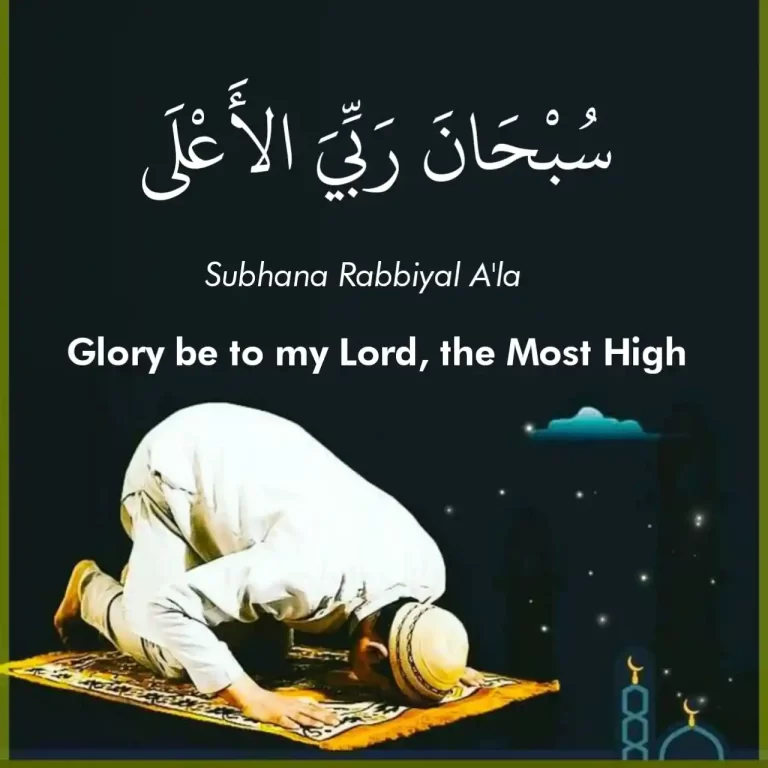Sunnah Prayers in Islam, Meaning, Hadith, And Benefits
Sunnah prayers, also known as voluntary prayers, are an important aspect of worship that are often overlooked by many Muslims.
Advertisements
These additional prayers, which are not obligatory like the five daily prayers, are performed to gain extra blessings and to increase one’s spiritual connection with Allah.
While they are not wajib like the five daily prayers, they are highly encouraged, and their benefits cannot be overstated.
In this blog, we will delve deeper into the significance of Sunnah prayers and explore their importance in our daily lives as Muslims.
We will examine their various forms and the specific times when they should be performed.
Advertisements
We will also discuss the many benefits of incorporating these voluntary prayers into our worship routine, and how they can help us to attain closeness to Allah and improve our overall spiritual wellbeing.
What are Sunnah Prayers?
Sunnah prayers are additional prayers that are performed voluntarily by Muslims. These prayers are not obligatory, but they are highly encouraged and recommended by the Prophet Muhammad (peace be upon him).
How Many Sunnah Prayers Are There?
There are various types of Sunna prayers, each with its own time of performance. There are various types and classes of optional prayers. Here are some examples of Sunnah prayers:
Rawatib Prayers
Rawatib prayers are done before the obligatory prayers and they are of two types:
Sunnah Mu’akkadah
The regular Sunnah Mu’akkadaat prayers fall into two categories:
Advertisements
Sunnahs which are done before the obligatory prayer: two rak’ahs before Fajr and four before Zhuhr.
Sunnahs which are done after the obligatory prayer: two rak’ahs after Zhuhr, two rak’ahs after Maghrib and two rak’ahs after ‘Isha.
These are the twelve rak’ah. Whoever observes them every day and night, “Allah will build a house for him in Paradise,” as contained in the hadeeth of Umm Habeebah, may Allah be pleased with her.
Advertisements
Sunnah Prayers Before And After Fard Prayers
1. Two Rak’ahs before Fajr
This prayer is called rak’ataa Al fajr. It is performed before the obligatory Fajr prayer and consists of two units of prayer.
2. Four Rak’ahs before Dhuhr
This prayer is performed before the obligatory Dhuhr prayer. It consists of four units of prayer with tasleem after two rak’ahs.
3. Two Rak’ahs after Maghrib
This prayer is performed after the obligatory Maghrib prayer. It consists of two units of prayer.
4. Two Rak’ahs after Isha
This prayer is performed after the obligatory Isha prayer. It consists of two units of prayer.
The ‘Asr (Late-Afternoon) Prayer has no routine Sunnah (basic recommended voluntary prayer).
However, it is mustahab (preferable and recommended) that one prays 4 Rak’at before the ‘Asr Prayer.
The 4 Rak’ahs are of less reward and significance in importance of adhering to them compared to the “sunan al-rawatib” described above.
The 4 Rak’ahs are the ones intended by the Prophet (may peace and blessings be upon him) in saying: “May Allah have mercy on one who prays 4 rak’at before the ‘Asr Prayer.”
(Narrated by at-Tirmidhi no. 395 and he declared it a hassan and gharib Hadith. Al-Albany rated the Hadith as hassan in Sahih al-Jami’ No. 3493.)
Sunnah Prayers Chart

Non-Muakkadah Sunna Prayers
These are other optional Prayers which follow the obligatory Prayers but are not like these regular supererogatory Prayers.
This has been reported by Abdullah bin Mughafal, may Allah be pleased with him, that the Prophet SAW said,
“There is a Prayer between every two Adhans. There is a Prayer between every two Adhans” then added after the third pronouncement, “For whoever wills” so that people would not take it as regular Sunnah.
Hence, there is a regular Sunnah Prayer between the Adhan and Iqaamah of the Fajr and Zuhr Prayers.
Asr prayer has no regular Sunnah Prayer before it or after it but it is included in this hadeeth. When the Adhan for Asr is pronounced, one should observe two rak’ats before the Iqaamah.
Likewise, the Maghrib prayer has no regular Sunnah before it but it is good to observe two rak’ats after its Adhan.
There is a specific hadeeth regarding it; he SAW said, “Observe Salat before Maghrib” three times, and added after the third time, “for whoever wills.
Similarly, the Isha’ does not have a regular Sunnah Prayer before it but it is included in this hadeeth, that one should observe two rak’ats after the Adhan and before the Iqaamah.
Witr prayer
The scholars differ regarding the ruling of Witr in the night prayer. Some of them opine that it is obligatory, and whoever abandons it is sinful.
However, it is not comparable to the obligatory Prayers and it is not one of the pillars of Islam. Notwithstanding, it is obligatory and a person that neglects it is a sinner.
Others state that it is simply recommended, hence one is not sinful for abandoning it.
Duha (forenoon) prayer
The Duha Prayer is two rakdh or more which can be observed from the time the sun rises to the length of a spear till shortly before midday.
Tahiyyat-ul- masjid (upon entering the mosque)
Tahiyyatul-Masjid and that it is an emphatic Sunnah. If someone enters the mosque at any time it is disliked for him to sit before he prays two rak’ah.
And there is no difference in it being two rak’ah of Tahiyyatul-Masjid, regular optional prayer, obligatory prayer, Salatul-Istikharah or others. The important point is that he should not sit without performing two rak’ah.
Ishraq Prayer
Muslims can perform Salat al-Ishraq (the Post-Sunrise Prayer) about 20 or 45 minutes after sunrise, according to different schools of thought.
Two rak’ah of voluntary prayer after ablution
Whenever a person performs ablution, it is good for him to observe two rakah of prayer. This can be observed at any time, even if it is after ‘Asr prayer or after Fajr prayer.
The Prophet SAW asked Bilal bin Rabah, may Allah be pleased with him, about his most auspicious deed in Islam, and he replied,
“Whenever I perform ablution during the day or night, I would observe two rakah prayers.” And the Prophet SAW approved of that.
Night Prayers
It is the best of Salat after the obligatory prayers as it will be stated in the hadeeths, Allah willing.
Allah, Blessed be He and Exalted, has stated the praise for those who observe Salat in the night and He instructed His Prophet to observe Tahajjud (night prayer).
These are just a few examples of Sunnah prayers. There are many more, and each has its own specific time of performance.
Hadith About Sunnah Prayers
Concerning the benefits of sunna prayers, Prophet Muhammad (peace and blessings of Allah be upon him) said:
“Whoever prays twelve rak’ahs during the night and day, a house will be built for him in Paradise: four before Zhuhr and two after, two rak’ahs after Maghrib, two rak’ahs after ‘Isha and two rak’ahs before Fajr prayer.”
Narrated by al-Tirmidhi; classed as sahih by al-Albani in Sahih al-Jami’, 6362
You should know that one of the Favours of Allah, the Mighty and Sublime, is that He legislated supererogatory Prayers for His servants as an addition to obligatory prayers in order for them to augment the obligatory prayers.
This is because the obligatory Prayers are not usually free from deficiency, so Allah, the most High, legislated the supererogatory prayers for His servants in order to boost their obligatory prayers.
If He had not legislated them, they would have been innovation (Bid’ah).
However, Allah – the most High – legislated these optional prayers, out of His Grace, so as to complement the deficit in the obligatory Prayers.
The Importance of Sunnah Prayers
Performing Sunnah prayers has many benefits, both spiritual and physical. Here are some of the ways Sunnah prayers can enhance your spiritual connection with Allah:
The Sunnah prayers will make up the shortfall in the obligatory prayers on the day of Resurrection.
Increased blessings and reward: By performing supererogatory prayers, you can gain extra blessings and rewards from Allah. The more you perform these voluntary prayers, the more blessings you will receive.
Strengthening your faith: supererogatory prayers are a way to strengthen your faith and devotion to Allah. They help you to stay connected to Allah throughout the day and to remember Him constantly.
Purifying the soul: Sunnah prayers can help to purify your soul and cleanse it from sins. They are a way to seek forgiveness and to improve your overall spiritual wellbeing.
Developing discipline: By performing Sunna prayers, you can develop discipline and self-control. This can help you to become a better person and to lead a more fulfilling life.
Showing gratitude: Sunnah prayers are a way to show gratitude to Allah for all the blessings in your life. By performing these voluntary prayers, you are acknowledging Allah’s greatness and expressing your thankfulness to Him.
Summary
In conclusion, Sunnah prayers are an important aspect of Islamic worship that can help to enhance our spiritual connection with Allah. By performing these voluntary prayers, we can gain extra blessings and rewards, strengthen our faith, purify our soul, develop discipline, and show gratitude to Allah.
It is important to make supererogatory prayers a regular part of our daily routine.
Advertisements







